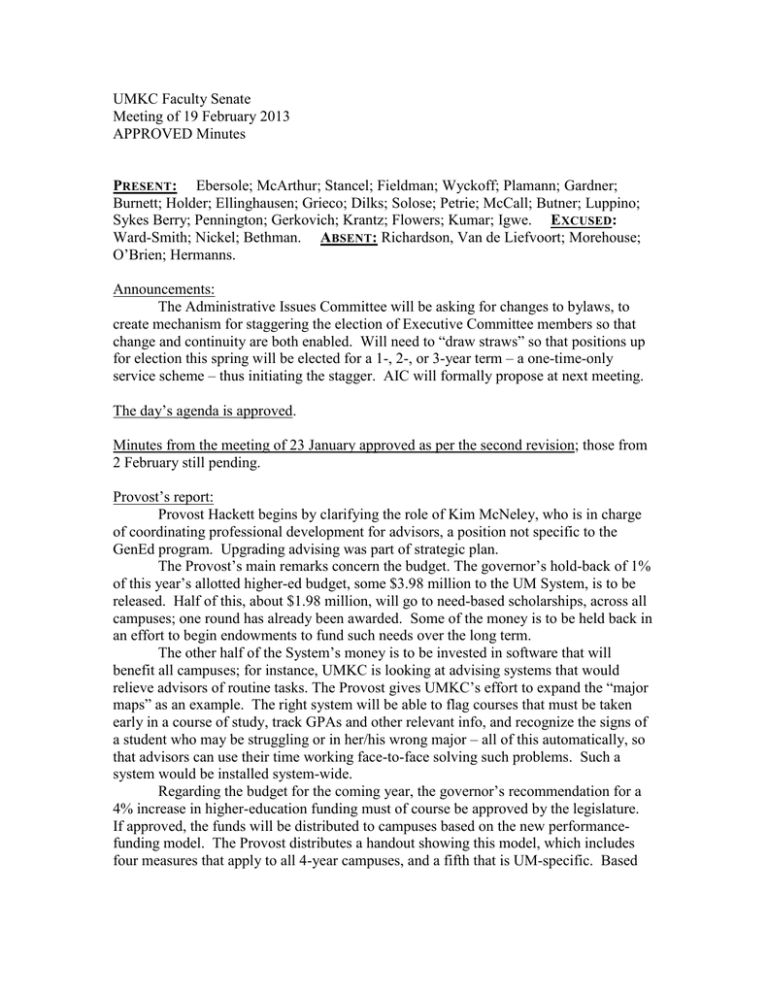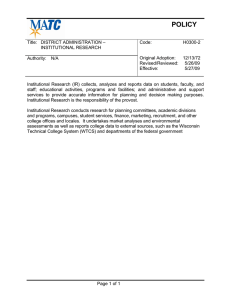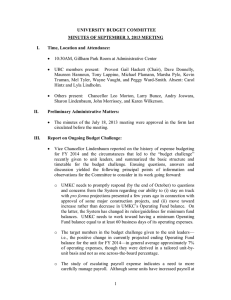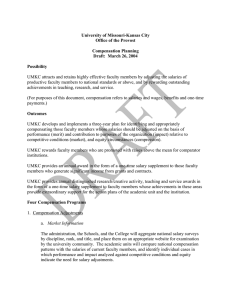UMKC Faculty Senate Meeting of 19 February 2013 APPROVED Minutes
advertisement

UMKC Faculty Senate Meeting of 19 February 2013 APPROVED Minutes PRESENT: Ebersole; McArthur; Stancel; Fieldman; Wyckoff; Plamann; Gardner; Burnett; Holder; Ellinghausen; Grieco; Dilks; Solose; Petrie; McCall; Butner; Luppino; Sykes Berry; Pennington; Gerkovich; Krantz; Flowers; Kumar; Igwe. E XCUSED: Ward-Smith; Nickel; Bethman. ABSENT: Richardson, Van de Liefvoort; Morehouse; O’Brien; Hermanns. Announcements: The Administrative Issues Committee will be asking for changes to bylaws, to create mechanism for staggering the election of Executive Committee members so that change and continuity are both enabled. Will need to “draw straws” so that positions up for election this spring will be elected for a 1-, 2-, or 3-year term – a one-time-only service scheme – thus initiating the stagger. AIC will formally propose at next meeting. The day’s agenda is approved. Minutes from the meeting of 23 January approved as per the second revision; those from 2 February still pending. Provost’s report: Provost Hackett begins by clarifying the role of Kim McNeley, who is in charge of coordinating professional development for advisors, a position not specific to the GenEd program. Upgrading advising was part of strategic plan. The Provost’s main remarks concern the budget. The governor’s hold-back of 1% of this year’s allotted higher-ed budget, some $3.98 million to the UM System, is to be released. Half of this, about $1.98 million, will go to need-based scholarships, across all campuses; one round has already been awarded. Some of the money is to be held back in an effort to begin endowments to fund such needs over the long term. The other half of the System’s money is to be invested in software that will benefit all campuses; for instance, UMKC is looking at advising systems that would relieve advisors of routine tasks. The Provost gives UMKC’s effort to expand the “major maps” as an example. The right system will be able to flag courses that must be taken early in a course of study, track GPAs and other relevant info, and recognize the signs of a student who may be struggling or in her/his wrong major – all of this automatically, so that advisors can use their time working face-to-face solving such problems. Such a system would be installed system-wide. Regarding the budget for the coming year, the governor’s recommendation for a 4% increase in higher-education funding must of course be approved by the legislature. If approved, the funds will be distributed to campuses based on the new performancefunding model. The Provost distributes a handout showing this model, which includes four measures that apply to all 4-year campuses, and a fifth that is UM-specific. Based on this information, the Provost believes the system will be in line for the full amount of funding available. Responding to a question, the Provost notes that measures to distribute the funds within the UM system are different than those used to assess the system itself; these measures were not agreed upon until too late for immediate implementation, and so the metrics for campus-specific distribution are unclear at this point. A second question asked about the category “Sustained Excellence” from the handout. The provost explained that members of this category are within the top third, compared to their peers, within the given metric; the UM system is ahead of the established benchmark in the four measures that apply to all four-year institutions. The Senate went into executive session for the remainder of the meeting.



